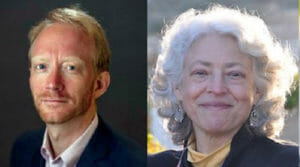
COVID is booming and restrictions are getting more stringent. We’ve all seen this before and it’s led to a disaster in senior living communities. Older adults continue to be isolated and withdraw inward. Herculean efforts to keep residents engaged is wearing out staff to the point of burn-out.
We are stuck with an ethical dilemma. Do we focus mainly on physical care, protecting our most vulnerable population from illness? Or do we focus attention on psychological well-being, keeping residents engaged and in contact with other people. How can we find a balance between the two?
Vicki de Klerk-Rubin, Executive Director of the Validation Training Institute (VTI)I watched her 92-year-old father withdraw inward. He had been a dynamic, active man for 90 years but in his final two years, the isolation that kept him safe from COVID sapped his connection to this world.
He forgot how to Skype, something he had done with Vicki every day (sometimes more). He couldn’t figure out how to use his e-reader anymore and this was a man who read endlessly. He became smaller, like his world. The protective walls of his home became limits to socialization and contact with his many friends. Devoid of his many friendships (of which he was very proud), he slept a lot.
Vicki shared that if she could have a do-over, she would have encouraged him to have more contact with his friends, found more creative ways for him to visit with people and keep physically active.
In many situations, this issue boils down to the old quality versus quantity decision. Do you want more years to live, or do you want more quality of life?
This is a personal question, and each individual must find the balance that feels right in the moment. With the pandemic, our choices become more fraught and limited by social regulations and concern for those around us. We are asked to get creative about how to safely engage with older adults and others who are in a high-risk category.
Vicki shared with Linked Senior that a lot of research has been done on the biological effects of nearness, touch and direct eye contact.
For instance, Dr. Fiona Kerr, the founder of the NeuroTech Institute in Australia writes, “From the instant we first lock eyes with another person, specialized brain cells spark into action and if that gaze is warm or even neutral, our brain is flooded with lovely chemicals as we start to form a connection that is as much neural and physiological as it is social.”
Something as simple as making direct, warm eye contact can stimulate an older adult and create engagement. Despite masks that cover our mouths and noses, gloves that prevent direct skin contact and protective clothing – we can make a difference in how an older adult, especially someone who is disoriented, keeps connected to the world and it can prevent withdrawal inward. This is clear in Vicki’s work with VTI in which the Validation method is used to help formal and informal caregivers better communicate with older adults living with Alzheimer’s disease and related dementias.
Next month, VTI and Linked Senior will host the first of its kind Validation First World Congress on February 15th. This free, virtual event will be a celebration of the 40 years of training provided by VTI and a way to define the future of the Validation method. It will highlight the current needs of today’s caregivers to create a path to continue innovating and supporting the lives of elders worldwide. The full agenda and registration are now available here.
It is possible to find the balance between care (preventing illness) and caring (maintaining contact and connection). It takes everyone working together and using their creativity, their hearts and remembering how important quality of life is for older adults, especially those who live in a personal reality.
Charles de Vilmorin is the CEO and co-founder of Linked Senior.
Vicki de Klerk-Rubin is the daughter of Naomi Feil who created the Validation Method, and the Executive Director of the Validation Training Institute. She is a certified Validation Master and authored two books: Validation for Family Caregivers and Validation for First Responders. For more information on the Validation method, please visit their website or YouTube channel.
The opinions expressed in McKnight’s Long-Term Care News guest submissions are the author’s and are not necessarily those of McKnight’s Long-Term Care News or its editors.





